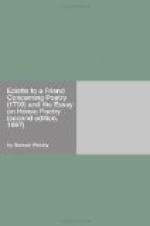And here I should drop the Discourse of Fable, were there not another sort of Persons still to deal with, perhaps more importunate than the former: The first will not like a Piece unless ’tis all Fable, or at least the Foundation of it: These latter run into the contrary extreme, and seam unwilling or afraid to admit anything of Fable in a Christian Poem; and as Balzac in his Critics on Heinsius his Baptista, are frighted, as at some Magical Charm, if they find but one Word there which was made use of by the old Heathens; which, says he, (unluckily as things have since happened) is as preposterous as to see Turks wear Hats, and Frenchmen Turbants; the Flower-de-lis in the Musselmens Colours, or the Half-Moon on the Standard of France. He’s, however, it must be granted, justly angry with Tasso, as Mr. Dryden since, for setting his Angels and Devils to stave and tail at one another; Alecto and Pluto on one side, and Gabriel and Raphael o’ t’other; as well as with Sannazarius, for mingling Proteus and David, and calling the Muses and Nymphs to the Labour of the Blessed Virgin, Tho’ the truth is, the Italian Poets seem more excusable, at least to a Papist, in this Case, than any other Nation, who parted with as little of their Idolatry as they could possibly, after they had kept it as long as they were able, making the Change very easie, and turning their Pantheon into an All Saints; much like the good Fathers in the Spanish Conquests in America, who suffer the Natives to keep their Old Idols, so they’ll but pay for ’em, and get ’em christen’d; by this means making many a good Saint out of a very indifferent Devil. So far, I say, Balzac is undoubtedly in the right, that Christianity and Heathenism ought not to be confounded, nor the Pagan Gods mention’d, but as such, in Christian Poems. Of which Boileau also says, “They should not be Fill’d with the Fictions of Idolatry;” tho’ he tells us just before,
In vain have our mistaken Authors try’d
Those ancient Ornaments to lay aside.
As tho’ he were afraid lest all Poets shou’d be forc’d to turn Christians, and yet in the next Lines he thinks it full as bad,
To fright the Reader in each Line with
Hell,
And talk of Satan, Ashtaroth and Bel.
As tho’ he’d have no Christian to be a Poet. And much at the same rate is Monsieur Balzac very angry with Buchanan, for the same reason; nor will he by any means let us substitute Belzebub, Asmodeus, and Leviathan, in the room of Alecto, Tisiphone, and Megaera, which is, in his Opinion, perfect Pedantry and Affectation; and is extreamly afraid, lest any of those Barbarous Hebrew Words should disfigure the purity of the Latin Tongue; when surely he cou’d not but know, that this pure Latin Tongue it self, for which he’s so much concerned, is nothing but the gradual Corruption or Barbarizing of the Greek; as that of the Phonician and Hebrew before; and the Italian, and his own French too, from the Latin afterwards,




